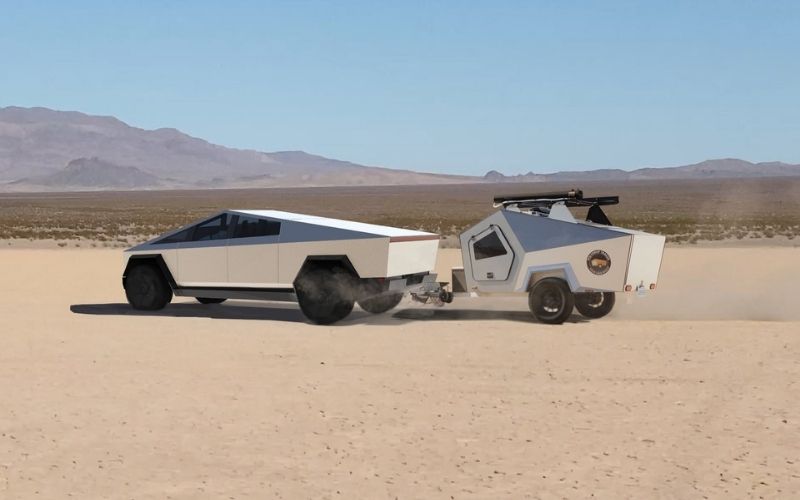Towing a trailer with your personal vehicle is a convenient and much more affordable way to pull a trailer or move.
Renting Uhaul trailers for moving or campers for vacation adds up over time.
If you’re vacationing every weekend during the summer, you may be better off purchasing your own camper and installing a trailer hitch.
The problem, of course, is the upfront cost of these transactions. I know that when we were looking for our first trailer, we spent more than 6 months researching the best prices.
The average cost to install a trailer hitch is $200. This price can range from $100 to $300, depending on the type of hitch you need and the make and model of your vehicle.
Some hitches are more expensive than others, but the installation cost is usually around the same.
If you need a hitch for a specific vehicle, you can check online to find a list of recommended hitches.
Once you’ve found the hitch you need, contact a local mechanic or trailer shop to get an estimate for installation.
Most likely, they will give you a range of prices depending on how difficult it is to install the hitch.
If it’s a simple installation, it will be on the lower end of the price range. If it’s a more complicated installation, it will be on the higher end.
If you’re handy with tools and want to save some money, you can install the hitch yourself. However, I would only recommend this if you’re confident in your ability to do so.
Here’s some more information on what it will cost to install a trailer hitch on your specific vehicle and where you should go to get it done.
What is a Trailer Hitch
A trailer hitch is a device that connects your vehicle to a trailer. It allows you to tow a trailer behind your vehicle and is an essential piece of equipment if you plan on doing any towing.
Different Types of Trailer Hitches
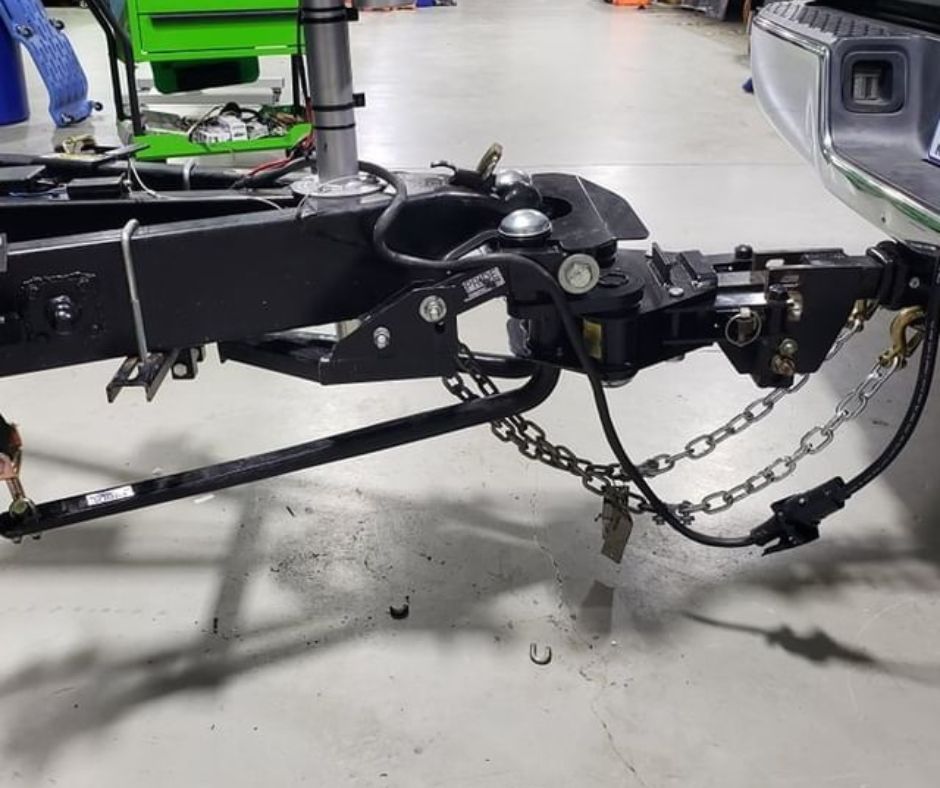
There are many different types of hitches. They include:
The type of hitch you need will depend on the type of trailer you’re using and your vehicle.
For example, if you’re towing a small trailer, you may only need a receiver hitch. If you’re towing a large fifth wheel, you will need a fifth-wheel hitch.
Your local mechanic or trailer shop will be able to help you determine which type of hitch is best for your vehicle and trailer, but the kind you will need for a pull-behind camper or trailer is the receiver hitch, also sometimes called a bumper hitch or a ball mount hitch.
Receiver hitch
The receiver hitch is a trailer hitch that hooks up to the underside of your car in the rear. It has a receiver tube that takes an insert with a ball attached.
The receiver hitch consists of three parts: the hitch receiver, the ball mount, and the hitch ball.
The hitch receiver is a metal tube that attaches to the back of your vehicle.
The ball mount is a metal plate that attaches to the hitch receiver. The hitch ball is a metal ball that attaches to the ball mount.
This type of hitch is very versatile and can be used to tow a variety of different trailers.
Class 1 receiver hitch
The class 1 hitch is the smallest and lightest duty hitch. It has a 1-1/4 inch receiver tube and can tow up to 2000 pounds.
Most cars and trucks can accommodate this size receiver hitch.
Class 2 receiver hitch
The class 2 hitch is a bit bigger and heavier duty than the class 1. It has a 2-inch receiver tube and can tow up to 3500 pounds.
Most cars and trucks can also accommodate this size receiver hitch.
Class 3 receiver hitch
The class 3 hitch is even more capable. It has a 2-inch receiver tube and can tow up to 10000 pounds.
Typically, you’ll need at least an SUV or a light-duty truck for this size.
Class 4 receiver hitch
The class 4 hitch is one of the most capable receiver hitches. It has a 2-1/2 inch receiver tube and can tow up to 12000 pounds.
You’ll need a heavy-duty truck for this size hitch. Some light-duty pickups can handle it, but you’ll have to check the towing specifications of your particular model to find out.
Class 5 receiver hitch
The class 5 hitch is the most capable receiver hitch. It has a 2-1/2 inch receiver tube and can tow up to 20000 pounds.
This size hitch is only for heavy-duty trucks.
Class 6 receiver hitch
The class 6 hitch is the same size as the class 5, but it can tow up to 26000 pounds and is reserved for commercial use.
There are virtually no recreational bumper pull trailers that weigh more than this, so it’s unlikely that you’ll need any more towing capacity than a Class 5 for your camper.
How Much Does it Cost to Install a Trailer Hitch?
There are a lot of different trailer hitch components that affect the price. Your specific vehicle is only one factor. Other factors include:
Receiver
The part of the trailer hitch that bolts to the frame is called the receiver, and it’s one of the most important parts of your hitch. It offers the structural integrity you need to tow a trailer or camper.
This is also the part of the hitch that contains the classification of 1-6, indicating how much weight it can pull.
Receivers usually cost anywhere from $100-250, depending on the manufacturer and the classification. Heavy-duty classifications cost more.
Ball mount
The ball mount is the part of the hitch that slides into the receiver. It connects the ball to the vehicle.
There are several different sizes and styles, but it’s just a tube that slides into the receiver and has a platform on which you can mount the ball.
They’re typically not too expensive, ranging from $10-50. The price depends on the brand and quality of the mount.
Hitch pin
The hitch pin locks the ball mount in place. It’s an L-shaped piece of metal that slides through holes in both the receiver and ball mount. Once clasped, it secures the ball mount so it won’t shift.
You can get these relatively cheaply and usually cost less than $20. They’re extremely simple, but extremely effective.
Trailer ball
Just like it sounds, this piece is a ball. It connects your trailer to your vehicle. It’s made of metal with a threaded post that attaches to the ball mount.
They come in various sizes including 1 7/8 inches, 2 inches, 2 5/16 inches, and 3 inches. Larger balls tow more weight and are therefore more expensive.
You’ll find balls between $5 and $40.
Safety chains
As simple as they may seem, safety chains are essential for your hitch setup.
These metal chains make sure everything is secure, and protect you, your vehicle, and your trailer in the event that the ball connection fails.
All hitch setups use two chains hooked up in an X shape below the ball. the tongue of your trailer to the receiver.
If your trailer ever slips off of the ball, these chains will ensure your trailer remains connected to your vehicle until you can pull off to safety.
These simple components cost less than $20. As such a reasonable cost, there’s absolutely no reason to skip this important step for safety.
Wiring harness
The wiring harness is a plug that allows you to connect your trailer brakes to your two vehicle brakes.
This ensures that people traveling behind you can see your brake lights and turn signals.
A wiring harness costs $10-50 and is necessary to stay legal while towing your camper.
Installing a Trailer Hitch
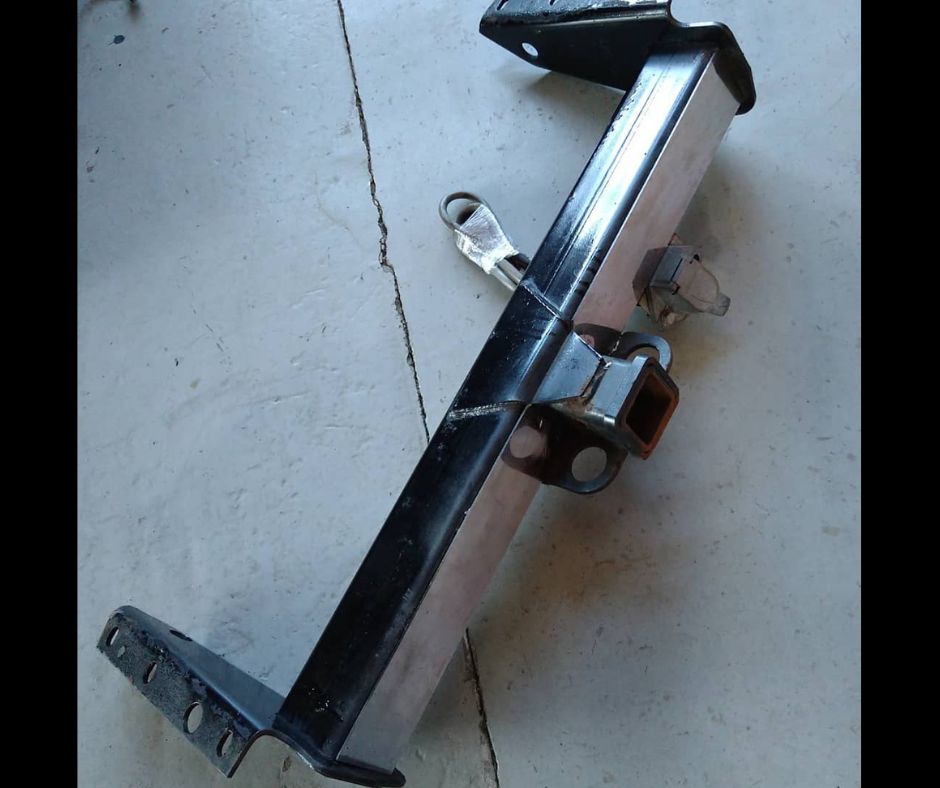
Installing a trailer hitch is not a difficult task, but it is important to follow the instructions carefully.
The first step is to determine which type of hitch you need for your vehicle and trailer.
Once you know which hitch you need, the next step is to find a place to install it. You can either do this yourself or take it to a mechanic or trailer shop.
If you’re going to install it yourself, the first thing you need to do is read the instructions that come with the hitch. These will tell you what tools you need and how to install the hitch.
Where to Find the Best Trailer Hitch Installers Near You?
There are many different places that sell and install trailer hitches. Some will only install a hitch that you bought from them, while others will install any hitch, as long as it’s compatible with your vehicle.
If you’re not sure where to start, the best place to look is your local Yellow Pages or online directories. You can also ask friends or family if they know of a good place to get a hitch installed.
Once you’ve found a few places, call them and ask about their rates and services. Be sure to ask if they have experience installing the type of hitch you need.
You should also ask about any warranties or guarantees that they offer. This will give you peace of mind in knowing that you’re getting a quality installation.
Finally, when you’ve found a place you’re comfortable with, make an appointment to have your hitch installed.
Most places will be able to do it while you wait, but it’s always best to call ahead and make sure.
1) UHaul
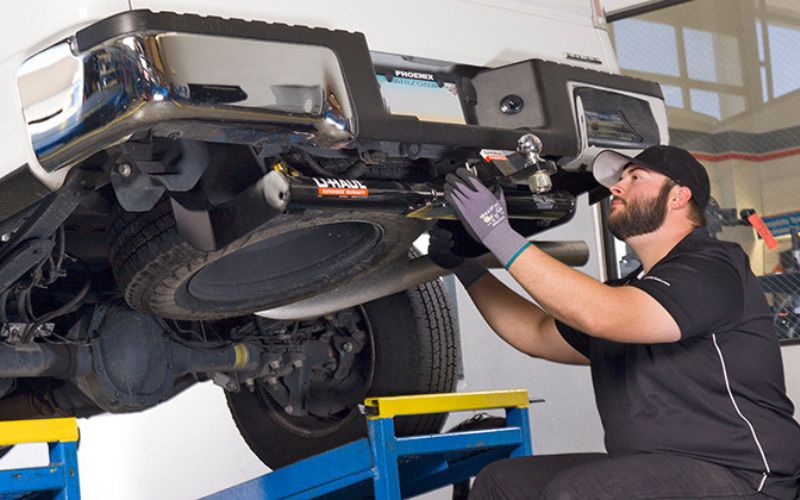
UHaul is one of the most popular places to get a hitch installed. They have a wide variety of hitches to choose from, and their prices are very competitive.
They’re also one of the easiest places to get in and out of because they have more than 1,500 locations nationwide.
Most UHaul locations will install any type of hitch, as long as it’s compatible with your vehicle.
They also offer a warranty on their installations. You can opt for a lifetime warranty on any installation for an extra fee.
UHaul also offers an online screening to help you figure out which type of trailer hitch is compatible with your vehicle.
2) Local trailer shops
There are many trailer shops that sell and install hitches. These shops typically specialize in trailers and can usually provide you with a hitch that’s specific to your needs.
The downside to using a trailer shop is that they may not have as much experience installing hitches as some other places.
However, they can usually give you a better price on the hitch and installation.
3) Auto shops

Many auto shops, such as Midas or Meineke, also sell and install hitches.
These shops typically have more experience than trailer shops, but they may not have as many hitches to choose from.
Like trailer shops, auto shops can usually give you a better price on the hitch and installation. However, they may not offer a warranty on their work.
4) Online retailers
There are many online retailers that sell hitches and offer installation services.
These companies usually have a wide variety of hitches to choose from and can often give you a better price than offline retailers.
Online retailers that offer trailer hitch installation include:
One advantage of using an online retailer is that you can often read customer reviews before making a purchase.
This can help you make sure that you’re getting a quality product and service.
5) Pep boys
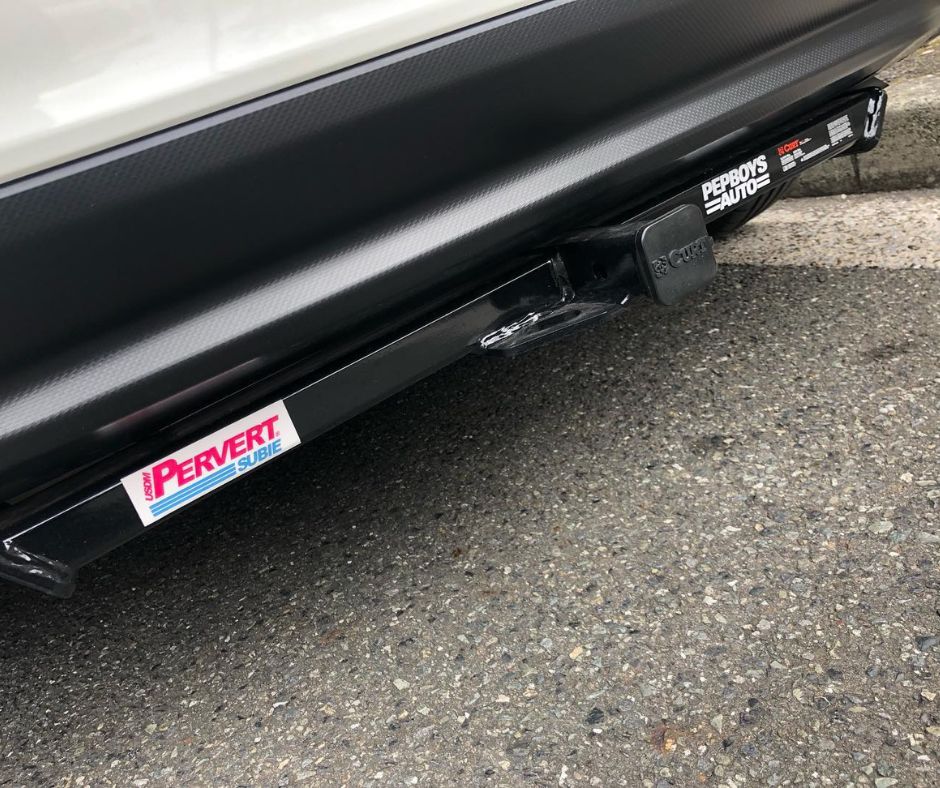
Pep Boys is a chain of auto parts and repair stores that sell and install hitches. They have a wide variety of hitches to choose from, and their prices are very competitive.
While they don’t have nearly as many locations as UHaul, they’re still a reliable source that offers a guide to determine which hitch is compatible with your vehicle.
6) Local tow truck companies
Many tow truck companies also sell and install hitches. The advantage of using a tow truck company is that they’re typically more experienced in installing hitches than other types of retailers. After all, trailers are all they do.
The downside is that they may not have a huge selection of hitches, so you’ll have to purchase your hitch somewhere else first.
7) Costco and Sam’s Club
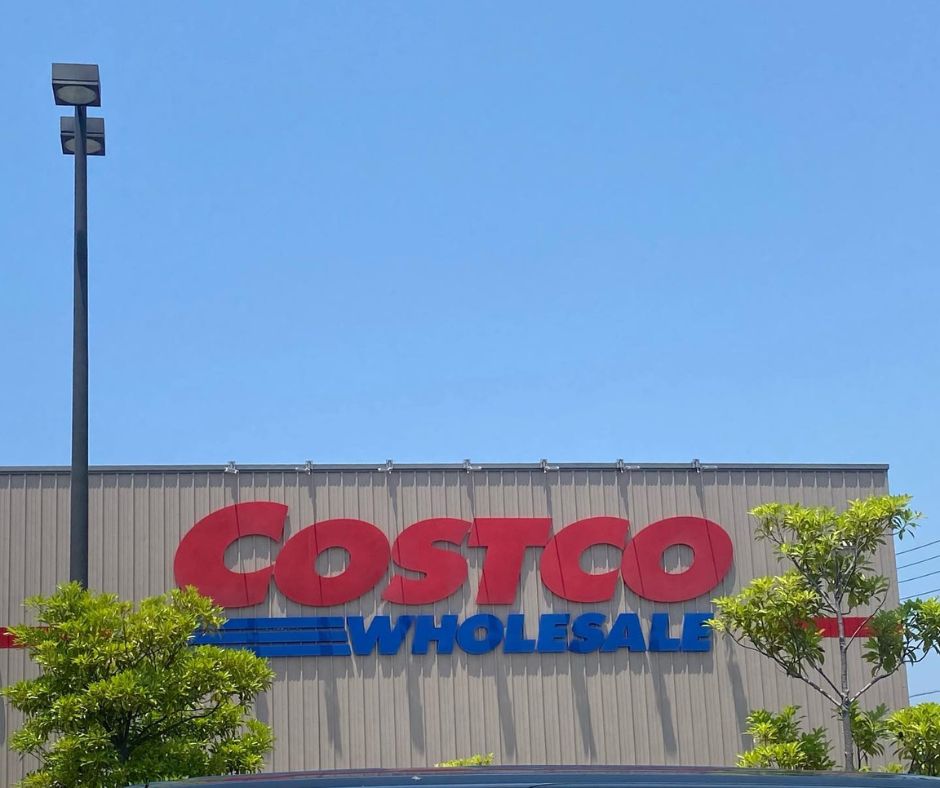
Believe it or not, some Costco and Sam’s Club locations do trailer hitch installations.
These membership-based clubs offer a wide variety of services, including auto repairs and trailer hitch installations.
Costco and Sam’s Club installation prices are typically very competitive. However, you must be a member to take advantage of their services.
Can I Install a Trailer Hitch Myself?
Installing a receiver hitch by yourself is a fairly simple task that most people can do themselves.
The first thing you need to do is remove the spare tire and any other obstacles that are in the way. Next, you’ll need to lower the exhaust system.
Once the exhaust is lowered, you’ll be able to see the bolts that hold the hitch in place, if you already have a hitch. Remove these bolts and then slide the hitch out.
To install the new hitch, simply reverse these steps.
If you don’t already have a hitch, you’ll need to drill holes into the frame of your vehicle.
This is a more difficult task and is best left to a professional. However, YouTube is a great resource for learning how to do all sorts of things.
If you have the tools and feel comfortable giving it a shot, you should. It could save you a lot of money.
However, it’s important to note that not all hitches are created equal.
Some hitches are very simple and can be installed in minutes, while others are much more complex and may require special tools or hours of work.
It’s important to consult the instructions that come with your hitch, or the website of the hitch manufacturer, to make sure you’re getting a hitch that you can install yourself.
How Long Does it Take to Install a Trailer Hitch?
This is a difficult question to answer because there are so many different types of hitches. Some hitch types can be installed in minutes, while others may take several hours or even require special tools.
It’s important to read the instructions that come with your hitch or visit the manufacturer’s website before you purchase a hitch.
This way, you’ll know what you’re getting into and can be prepared for the installation process.
As a general rule of thumb, it usually takes 1-2 hours to install a trailer hitch. But, as I said, there are many factors that can affect this time frame.
If you’re not confident in your ability to install the hitch, or don’t have the time, you can always hire a professional.
On average, it will cost you $50-100 to have a professional install your hitch. This is a reasonable price considering the amount of time and effort it takes to do the job correctly.
Most places also require you to make an appointment, because they won’t know how long it will take until they start the job.
To sum it up, a trailer hitch installation will cost you between $100-250. The actual cost will depend on the type of hitch, the complexity of the installation, and whether or not you hire a professional.
Keep in mind that this is just for the hitch itself. If you need to purchase additional equipment, such as a wiring harness or safety chains, the cost will be higher.
Trailer Hitch Installation Costs by Vehicle Type
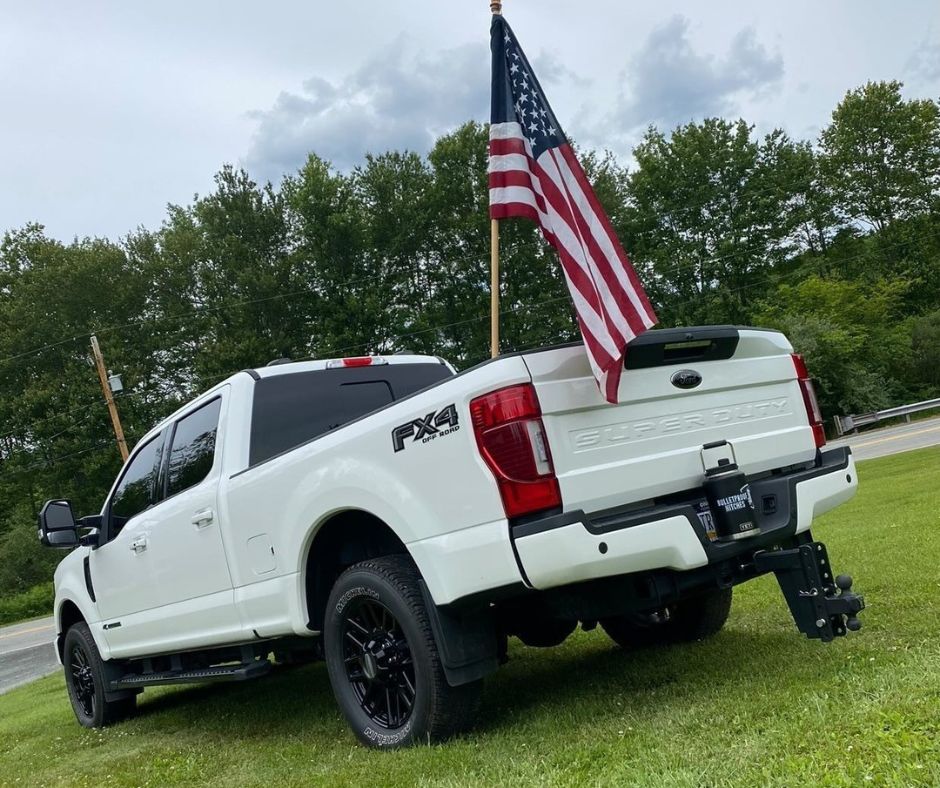
Most vehicles are equipped to handle a trailer hitch, but towing capacity varies by make and model.
Cars
Some smaller cars, such as the Honda Civic, can only tow up to 1,000 pounds. This means you’ll need a very small hitch and ball mount.
The installation process will be quick and easy, and shouldn’t cost more than $100.
Larger cars, like the Ford Explorer, can tow up to 5,000 pounds. This requires a bigger hitch and ball mount, which will be more expensive to purchase and install. Expect to pay between $200-250 for the entire job.
SUVs
The majority of SUVs on the market today are equipped to tow between 3,500 and 7,500 pounds. This means you’ll need a mid-sized hitch and ball mount.
The installation process will be more complex than it is for cars, but shouldn’t take more than 2 hours. The total cost will be between $150-200.
Pickup trucks
Most pickup trucks can tow up to 10,000 pounds or more. This requires a large hitch and ball mount, which can be expensive to purchase and install.
The installation process is also more complex than it is for cars or SUVs. Expect to pay between $200-300 for the entire job.
How Much Does It Cost to Install a Trailer Hitch? (with 9 examples)
Written by Mike Gilmour in Travel
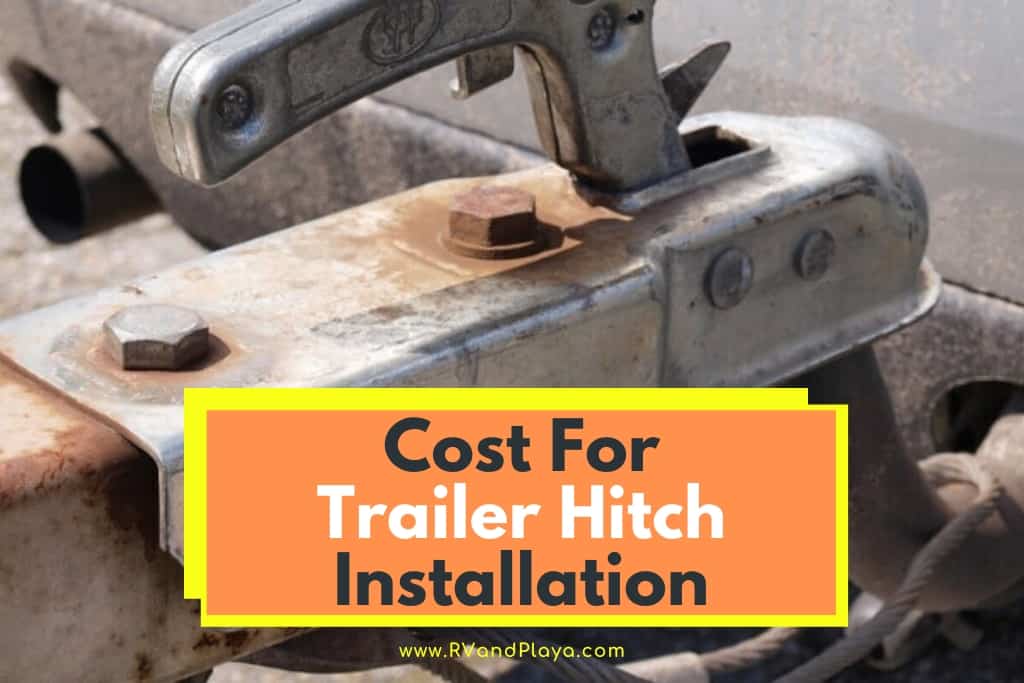
Perhaps you’ve just bought a new trailer, or you’re a long-time tower that’s just purchased a new vehicle without a trailer hitch. Either way, you’re probably interested in getting a trailer hitch installed, but are wary of the potential costs that are associated with doing so. Luckily, installing a trailer hitch is not a costly thing to do, at least as far as automotive maintenance and modifications go. However, the parts and labor together can add up to be more than mere pocket change, so you need to be aware of how much installing a trailer hitch should cost before you have it done to make sure that you’re not overpaying.
How much does it cost to install a trailer hitch? The cost of installing a trailer hitch varies depending on both the type of vehicle as well as the type of hitch. For general ball-style applications, though, parts will range from $150-$450, and labor will range from $100-$250.
The installation cost of a trailer hitch is highly variable, with the type of hitch, the type of vehicle, as well as the labor rate of the shop that you take it to all having a significant impact on the price of the installation. However, simply stating that something is variable is not terribly helpful, so let’s go into some detail regarding what all goes into installing a trailer hitch, as well as 12 examples.
Table of Contents
- What Are the Different Parts of a Trailer Hitch?
- Best Trailer Hitches
- What Goes into a Trailer Hitch Installation?
- Examples of Trailer Hitch Installation Costs
- Installing a Trailer Hitch on Popular Makes and Models (9 Examples)
- Trailer Hitch Installation Near Me
- Final Thoughts
- Read Next
What Are the Different Parts of a Trailer Hitch?
To understand the pricing structure of trailer hitch installations, it’s first essential to understand all the different parts that go into a traditional, rear-mounted, ball style trailer hitch. So, what are the different parts of a conventional ball style trailer hitch, and how much do they cost?
0 seconds of 23 secondsVolume 0%
GET BEST HITCH TRAILER ON AMAZON NOW
Receiver
The receiver is the part of the trailer hitch that actually bolts to the frame of the vehicle. The receiver is one of the most critical parts of a trailer hitch, as it is the only structural connection between your vehicle and what you’re towing.
Receivers generally cost between $100 and $250, depending on the brand as well as the class of hitch. The class of hitch refers to how heavy-duty it is, with different types being rated to tow different amounts. The different categories of trailer hitches, according to Curt Manufacturing, are:
- Class 1: Class 1 hitches are the least robust of all the types, and are only designed for cars and crossovers, with a GTW capacity of 2,000lbs.
- Class 2: Class 2 hitches are designed cars, crossovers as well as minivans, and have a GTW capacity of 3,500lbs.
- Class 3: Class 3 hitches are suitable for cars, crossovers, minivans as well as SUVs and trucks, and have a GTW capacity of 8,000lbs.
- Class 4: Class 4 hitches are for trucks and SUVs only, and have a GTW capacity of 10,000lbs.
- Class 5: Class 5 hitches are considered to be a heavy-duty hitch and are only suitable for trucks and SUVs. Class 5 hitches have a GTW capacity between 16,000lbs and 17,000lbs.
- Class 6: Class 6 hitches are reserved mostly for commercial use, and can only be installed on dually trucks, or trucks with a chassis cab. Class 6 hitches have a GTW capacity of between 18,000lbs and 20,000lbs.
Ball Mount
The next important piece of a trailer hitch is the ball mount. The ball mount is the piece that slides into the receiver, and thus connects the actual ball to the vehicle. There are many different styles of ball mounts for various applications, though most ball mounts simply consist of a piece that will slide into the receiver, as well as a small platform upon which the ball itself will be mounted.
Additionally, nearly all ball mounts will have a hole in the part that slides into the receiver to accommodate a hitch pin, and some may even be adjustable, which can help keep your trailer level. Ball mounts generally cost between $10 and $50, depending on the quality and style of the ball mount.
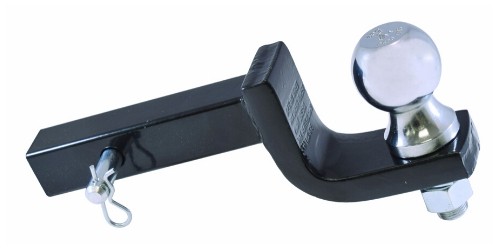
Hitch Pin
The next piece of the trailer hitch is known as the hitch pin. Hitch pins are very simple “L” shaped pieces of metal with a small clip hole on the end, and are inserted into a hole on the side of the receiver to pass through the ball mount and come out on the other side. This helps to lock the ball mount into the receiver and ensure that nothing will shift around when you don’t want it to. Hitch pins are quite cheap and typically cost below $20 as a result of their extreme simplicity.
Trailer Ball
The trailer ball is, as the name would suggest, a ball that serves as the sole point of physical connection between your vehicle and what you are towing. The ball is a simple part and consists of the actual metal ball itself, as well as a threaded metal rod that allows it to be attached to the ball mount.
Trailer balls usually cost between $5 and $40, depending on the size. The most common ball sizes are 1-7/8”, 2”, 2-5/16” and 3”. Larger balls are rated to tow more weight.
Safety Chains
An essential part of a safe towing setup is the safety chains. These are just metal chains, but they play an important role in making sure that your towing setup is secure. The safety chains attach to the vehicle itself as well as the trailer, and serve as a backup should the ball connection fail.
Two chains should be used at all times, and are to be run in an “X” shape below the ball connection. Safety chains are also very cheap and typically cost less than $20, making them a no-brainer for an extra bit of security.
Wiring Harness
The final piece of the puzzle is the trailer wiring harness. This is a collection of wires that connects to both the vehicle as well as the trailer. A trailer wiring harness is used to connect the brake lights and turn signals of the tow vehicle to the brake lights and turn signals of the trailer so that when the vehicle’s lights are activated, the trailer’s are too. Wiring harnesses typically cost between $10 and $50.
The above-listed parts are all that will be needed to fully install a rear-mounted ball style trailer hitch on most vehicles. As you can see, most parts are fairly inexpensive, with the only piece that will routinely cost more than $100 is the actual receiver itself. If we use the exact midpoint of all the above ranges, the total cost of a full kit will be about $290.
Not terrible; however, the actual parts themselves are only one part of the equation. Next, we need to factor in the labor costs associated with having a professional install the trailer hitch on your vehicle.
Best Trailer Hitches
Having the right trailer hitch is a very important part of towing your vehicle. Below you´ll find the 3 best Trailer Hitches:
| Promoted Product | Editor’s Pick | Best Value |
| B&W Trailer Hitches Tow & Stow Adjustable Ball Mount | CURT 13333 Class III Trailer Hitch | Reese Towpower Class III Starter Kit |
| The B&W Tow & Stow adjustable ball mount might be the most versatile option on the market.The Tow & Stow is adjustable to the height of your trailer for level towing, which is an incredibly handy feature if you happen to have more than one trailer. Y | The CURT 13333 is designed to provide a large variety of towing options. It works on everything including full-size cars, vans, trucks, and SUVs.These Class III trailer hitches are great for carrying fish boats, ATVs, and utility trailers. | A well-known brand when it comes to trailer and towing accessories, Reese Towpower has a wide lineup of hitches.This recommendation is a Class III starter kit, which includes a ball mount, hitch ball, pin, and clip. |
| Buy from Amazon | Buy from Amazon | Buy from Amazon |
What Goes into a Trailer Hitch Installation?
The installation of a trailer hitch is actually not a complicated process and is something that most weekend mechanics would be able to DIY with ease. However, it does involve a fair bit of wrench turning, and that’s something that most vehicle owners are not too comfortable with doing themselves.
So, if you’re not going to be installing your trailer hitch yourself, you’re going to have to take it to a professional to do it for you, which means paying their labor rate. This will, of course, vary from mechanic to mechanic, with AAA citing an incredibly wide range. They report some labor rates being as low as $47 per hour, while others charge as much as $215 per hour.
The first step in getting your trailer hitch installed is giving your mechanic a call. In doing this, you’ll want to get a quote that you can compare to the general process as well as specific examples listed below. When you get your quote, make sure that you’re told the rate per hour, as well as the total number of hours that they’ll be charging you for.
The important thing here is to know how many hours they’re quoting for the job, as we’re about to tell you how many hours they should be quoting you, so you can compare this to what they estimate.
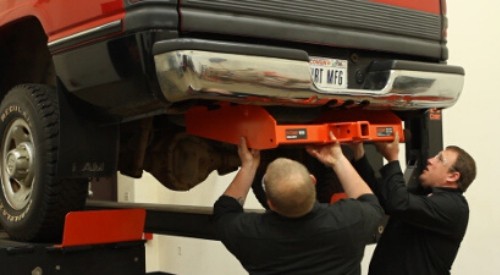
How many hours should it take to install a trailer hitch?
The number of hours that your mechanic quotes you for your trailer hitch installation should be a direct reflection of how difficult the installation is. To be able to assess this, you need to know what all goes into the installation of a trailer hitch, so, here is the general process, according to Curt Manufacturing:
- Remove the spare tire: The first step in installing a trailer hitch (after getting the vehicle in the air, of course) is to remove the spare tire, which should take most mechanics no more than 5 minutes. Some cars won’t have a spare tire in the way, but many trucks and SUVs do. If the vehicle does have a spare tire mounted underneath the rear, it will most likely need to be removed to access certain nuts and bolts and to continue with the installation of the trailer hitch.
- Prepare the vehicle for installation: The next step after removing the spare tire is to clear out the rest of the area to make room for the trailer hitch to be installed. Many vehicles will have various bolts and other pieces that may need to be removed before the installation of the trailer hitch, and this, of course, needs to be done before mounting the trailer hitch. The time that this process takes will vary widely based on the type of vehicle, but plan for this to take your mechanic no more than 30 minutes to do.
- Attach the hitch: After the vehicle is ready for the hitch to be installed following the removal of the spare tire and other pieces, your mechanic should be ready to mount the hitch. Getting the hitch positioned correctly can take a little bit of time depending on how good the fitting of the hitch is, but it should still not take a good mechanic a long time to do. Generally, the mounting of the hitch should take 30 minutes or less. After the hitch is mounted and secured, the car is ready to be lowered down, and the installation is complete.
As is evidenced by the relative brevity of the above list, mounting a trailer hitch is not a very difficult or time-consuming process, especially for a professional mechanic. In fact, even if we use the absolute maximum time that we’ve set out for each step of the installation,the installation will still only take your mechanic about one hour in total.
This is critical information for you to know: if your mechanic quotes you more than one hour’s worth of labor for the installation of a trailer hitch, they’re probably asking too much, unless you have a vehicle with special installation considerations like bumper cutting.
However, don’t expect them to quote much less than one hour either because, at least in our experience, you’re unlikely to find mechanics that will give quotes outside of 30-minute intervals, so they’ll probably just round their way up to one hour total.
If it’s a mechanic that you trust, and their labor rate isn’t too high, then you’re probably getting a fair deal on the installation of your trailer hitch at one hour of labor.
The following table shows the average installation costs for some popular trailer hitch (these costs are the latest we can investigate and may vary depending on the type of hitch)
| Models | Receiver Hitch | Average cost [USD] |
|---|---|---|
| Toyota RAV4 | Rear Receiver Hitch | $225-$390 |
| RAM Laramie 2500 | Class V Rear Receiver Hitch | $315-$430 |
| Mazda CX-9 | Class II Rear Receiver Hitch | $239-$354 |
| Hyundai Santa Fe | Class III Rear Receiver Hitch | $265-$345 |
| Honda Odyssey | Class III Rear Receiver Hitch | $240-$325 |
| Toyota Sienna | Class III Rear Receiver Hitch | $245-$390 |
Examples of Trailer Hitch Installation Costs
Talking in hypotheticals in general terms is helpful, but nothing is as useful as specific examples detailing exactly how much you can expect to pay to have a trailer hitch installed on your vehicle.
In this section, we’ll go over some examples of what it costs to have a trailer hitch installed on a car, an SUV as well as a truck, and we’ll also go into examples of what real people have paid to have trailer hitches installed on specific makes and models.
Installing a Trailer Hitch on a Car vs. an SUV vs. a Truck
To start, we’ll go over examples of what it will cost to install a trailer hitch on the three main types of vehicles that will be used for towing: cars, SUVs, and trucks. The installation process is similar for every kind of vehicle, though there are some unique differences that can affect the final price of installation.
Cars
Installing a trailer hitch on a car is going to be a slightly more involved and thus more expensive endeavor than doing the same thing on an SUV or truck. This is because cars are packaged more tightly and with less space to work, meaning that more work will need to be done to fit the trailer hitch under the car.
In some instances, installing a trailer hitch on a car will even require the exhaust system to be dropped to make room for the receiver. Additionally, most cars are not designed to accommodate a trailer hitch, so custom fabrication work may be required on some vehicles. If processes like these are necessary, expect to pay a little bit more for installation, though you should still be in the ballpark of the one-hour guideline that we discussed above.
SUVs
Installing a trailer hitch on an SUV is something that can vary quite a bit in cost. This is largely a result of how widely used the term SUV is: in some instances, it can be used to describe a small crossover, and in some other cases, it can be used to describe a body-on-frame, true SUV.
In either situation, the installation will be simpler and easier to do than on a car, only because SUVs both have more space, and are usually designed with the accommodation of a trailer hitch in mind. You should rarely be paying for more than one hour of labor to install a trailer hitch on an SUV.
Trucks
Installing a trailer hitch on a pickup truck is significantly easier, and thus cheaper, than installing a trailer hitch on a car or SUV. For one, most pickup trucks come from the factory with a trailer hitch installation being a foremost design consideration. OEMs know that many pickup truck owners will use their vehicle to tow, and make it easy to install trailer hitches because of this.
Secondly, trucks are easier because they have much more space to work with in the rear. There is less clutter from exhaust and drivetrain components, and the crash structures are generally less of a problem on trucks, too. For these reasons, installing a trailer hitch on a truck is just as cheap as it is easy for any mechanic to do. Installing a trailer hitch on a truck should never take more than one hour’s worth of labor, and in some instances, may even only elicit a half-hour charge.
Trailer Hitch Installation Cost on Popular Models
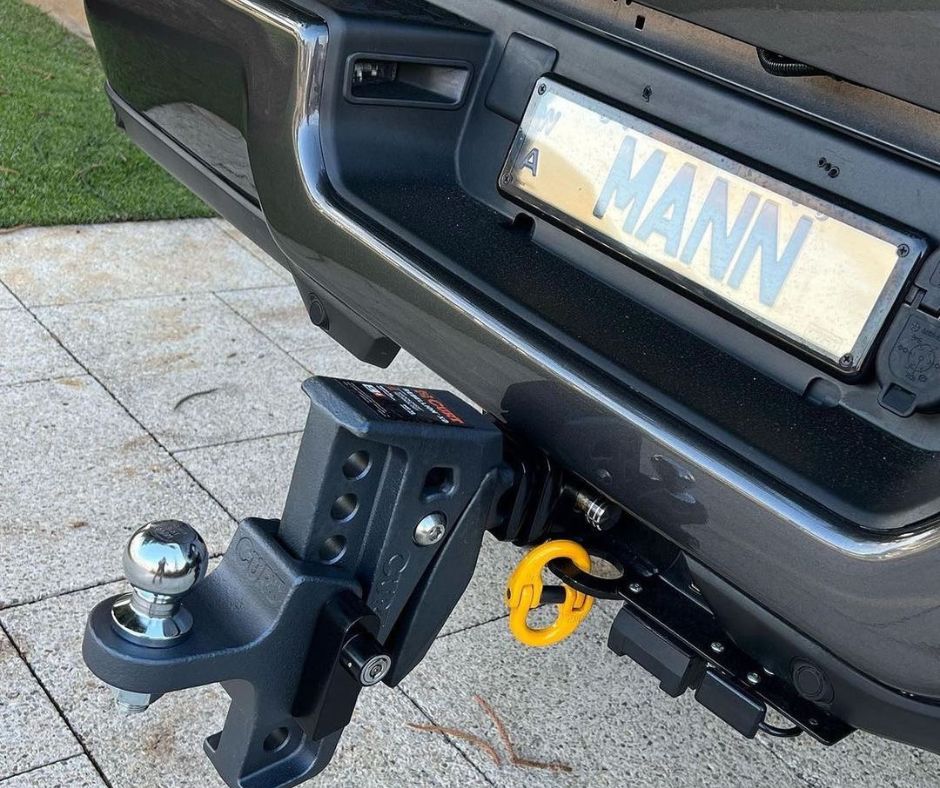
Here is some more detailed information about how much it costs to install a trailer hitch on popular car models today.
1. Honda Civic
Installing a trailer hitch on a Honda Civic will cost roughly $100 or less.
While Honda Civics can’t tow much, they’re a popular model on the road today, and are fully capable of towing a small trailer.
2. Ford Explorer
The Ford Explorer is a popular SUV that can tow up to 5,000 pounds. The hitch and ball mount will be more expensive than they are for the Honda Civic, but the installation process is still relatively simple and will only cost $200-250 in most places.
3. Jeep Grand Cherokee
The Jeep Grand Cherokee is another popular SUV, and it can tow up to 7,000 pounds.
It will cost $250-300 to install the hitch and ball mount because the installation process is more complex.
4. Ford F-150
The Ford F-150 is a popular pickup truck that can tow up to 13,200 pounds.
However, half-ton pickups of this size, including the RAM 1500 and the Chevy Silverado 1500 vary widely in their towing capacity, based on trim level and features. It will generally cost $300-350 to install a hitch.
It’s incredibly important that you don’t assume your half-ton pickup can tow 13,000 pounds until you look at the specifications of your vehicle.
The hitch and ball mount will be more expensive than they are for the Civic, Explorer, or Grand Cherokee, because it’s more capable, and the installation process is more complex.
5. Toyota Tacoma
It will cost $200-250 to install a trailer hitch on a Toyota Tacoma. This popular pickup truck can tow up to 6,800 pounds.
The hitch and ball mount will be more expensive than they are for the Civic or Explorer, but less expensive than they are for the F-150.
The installation process is more complex than it is for cars or SUVs, but shouldn’t take more than 2 hours.
6. Honda CR-V
The price to install a trailer hitch on a Honda CR-V is similar the Honda Civic. It will run $150-200.
This smaller SUV that can tow up to 1,500 pounds. It requires a small hitch and ball mount, which will be less expensive to purchase and install. The installation process is also relatively simple.
7. Toyota RAV-4
The Toyota RAV-4 can tow up to 3,500 pounds and installing a trailer hitch will cost $200-250.
This requires a mid-sized hitch and ball mount, which will be more expensive to purchase and install. The installation process is also more complex than it is for the CR-V.
8. Subaru Forester
The Subaru Forester is a small SUV that can tow up to 2,700 pounds. Installing a trailer hitch on Subaru Forester will cost $175-225.
It’s quite common to see Subaru Foresters toting teardrop trailers and other small campers.
This requires a small hitch and ball mount, which will be less expensive to purchase and install. The installation process is also relatively simple.
Final Thoughts
As you can see, the cost to install a trailer hitch varies depending on the vehicle you drive and the size of the hitch.
If you’re not sure what size hitch you need, or how to install it, I recommend talking to a professional. They’ll be able to help you select the right hitch and install it properly.

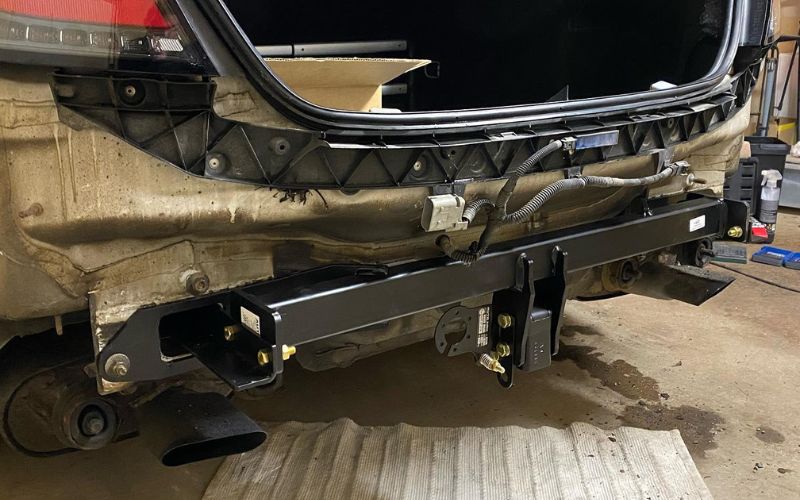
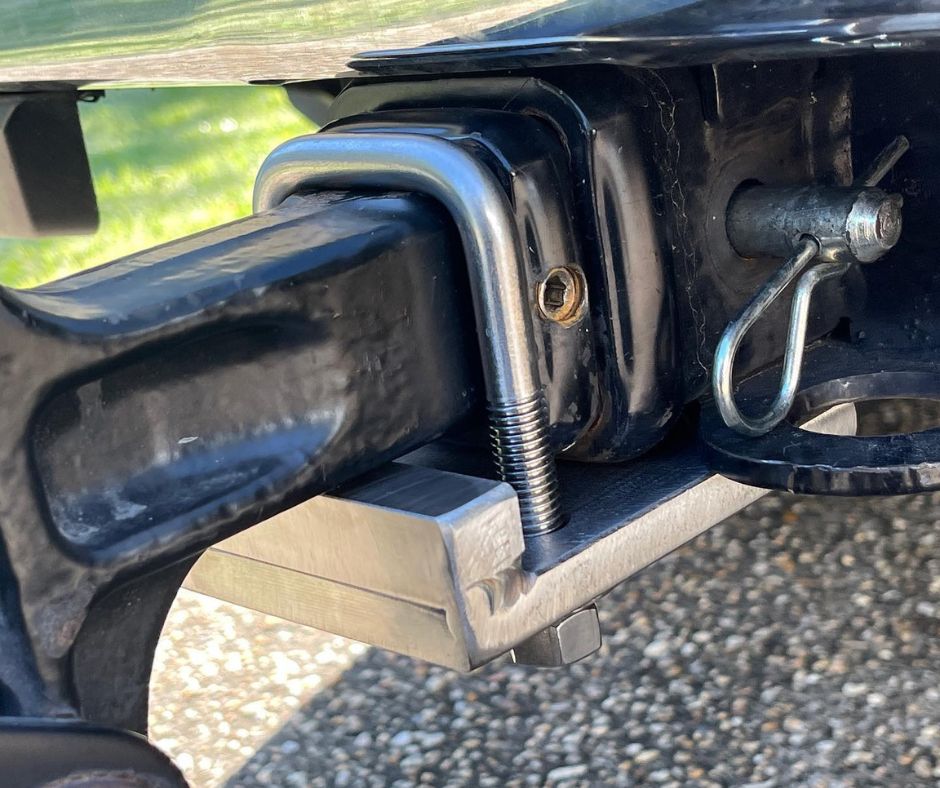
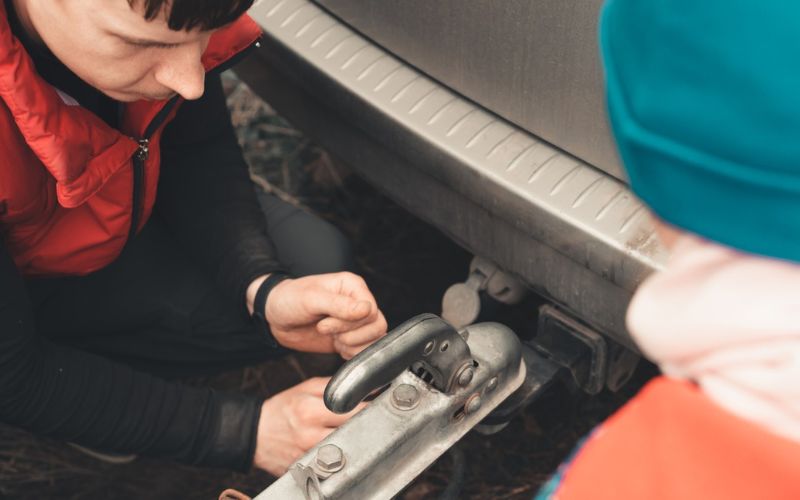

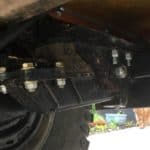
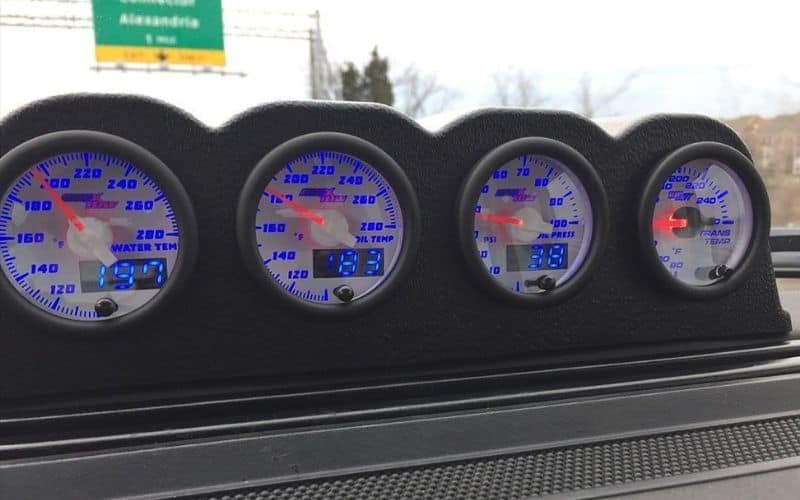
![6 Best RV Roadside Assistance Plans with Best Coverage in [currentyear] 18 RV about to be towed](https://www.rvingknowhow.com/wp-content/uploads/2022/04/Best-RV-Roadside-Assistance-Plans.jpg)
